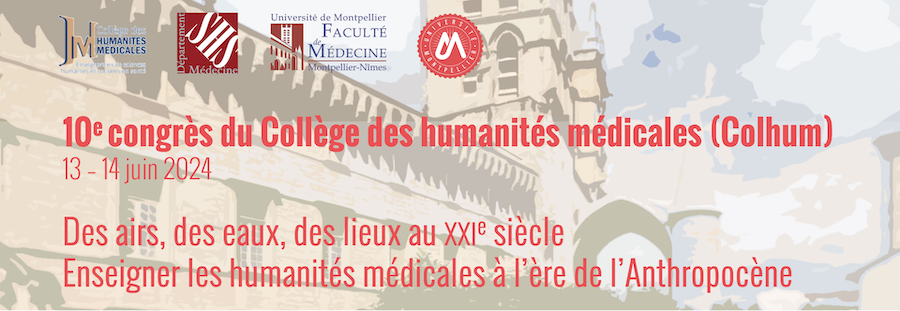
|
Homepage Air, water and space in the 21st centuryTeaching medical humanities in the Anthropocene eraAbstract The Collège des humanités médicales was created in 2008 to bring together humanities and social sciences teachers involved in medical training. These courses are usually taught by specialists in anthropology, geography, history, philosophy, political science or sociology. The outlook is therefore multi-faceted, as are the missions entrusted to them since 1992: training future doctors (initially in the first cycle, then more recently in the second cycle) and then other healthcare professionals, with the grouping of numerous courses within the health faculty. Finally, working conditions differ widely, with recognized departments on some campuses and more isolated colleagues on others, or with different injunctions in terms of teaching hours or digital shifts. While these issues call for a re-interrogation of the missions of medical humanities teachers, they go beyond their case and allow us to think more generally about the future of healthcare. The growing presence of digital tools in teaching reflects their presence in the daily lives of healthcare professionals and, beyond that, a vision of healthcare conditioned by a productivist culture: the world of Big Data is indeed that of the Anthropocene. The sociology of technology suggests that innovations are not just tools available to human beings, but that they profoundly change the way we look at things. What do digital tools, videoconferencing, MOOCS and other video clips do to relationships between teachers and students, or carers and patients? Is this just another string added to the pedagogical bow of our disciplines, in universities already punctuated by alternating compulsory small-committee practical tutorial sessions and lectures considered de facto optional? Or are we witnessing a change of direction, a transformation which, through the use of a supposedly individualized teaching format, is helping to homogenize the courses delivered? What is this new hybridization of the human being producing? Over and above the issues brought to light by the expansion of digital technology, we see this new congress as an opportunity to reflect on work. This very notion is often invisible in higher education or healthcare - two ideal-typical spaces for the practice of professionals who hardly recognize themselves in the status of worker. And yet, in all its variability, work raises the question of how to offer health students the contributions of the humanities: critical insights, ethical reflections, historical and political contextualization. What are the constraints and opportunities for improving the status of the humanities, and its workers, in healthcare training? These courses prepare young people to put on their lab coats, in other words, to combine technical biomedical knowledge with an understanding of the human being. How do medical humanities view the work of healthcare professionals? What divisions of labor, what place for the patient, what reflexivity on science, recommendations of good practice or choices of modes of practice and remuneration? Or how can we envisage practical healthcare work in the era of the Anthropocene, and the need to broaden our perspective (as evidenced by current preoccupations with "One Health" or "global health")? After an initial period of medical humanities dedicated to their appearance in medical training courses, and a second period that saw them introduced throughout the training program (second and third years, health service, sixth year), what future can we foresee for the humanities and social sciences in healthcare? One contemporary transformation, which is undoubtedly worth taking into account, is the blurring of boundaries between healthcare professions. In some cases, this is reflected institutionally in the creation of Health Faculty that are common to the various training courses. The medical humanities can then be considered and taught differently. What are the initial findings in this area? How can we offer common contributions and take into account the specificities of the care professions and their place in the division of labor, while at the same time being prompt to follow, if not encourage, new modes of collaboration between professionals? Based on these questions, papers will be divided into three indicative themes:
Calendar
Application procedure Proposals for papers are due by 1st Februray 2024. The form is available on the congress website, under the New submission tab. It will invite you to fill in your first and last name, your affiliation, the title of your paper and a short abstract (250 words max.) as well as a short biography (50-100 words) in the "comment" space. Contributions from all disciplines are welcome and early career researchers are particularly encouraged to apply. Papers in French and in English are welcome. Registration fees
For an exceptional fee waiver, please contact the congress organising team. The online registration and payment module will be open from 01/04/2024 to 09/06/2024. The registration gives access to the coffee breaks, the lunch and the festive evening on 13 June. Venue Faculté de médecine, 2 Rue de l'École de Médecine, 34090 Montpellier Information and contacts If you have any questions, please send an email to colhum2024@sciencesconf.org ORGANISING TEAM Guilhem Birouste, Vincent Bittoun, Éléonore Canet, Élodie Couren, Félix Jourdan, Solène Lellinger, Gilles Moutot, Jérémy Rollin, Laurent Visier.
|

